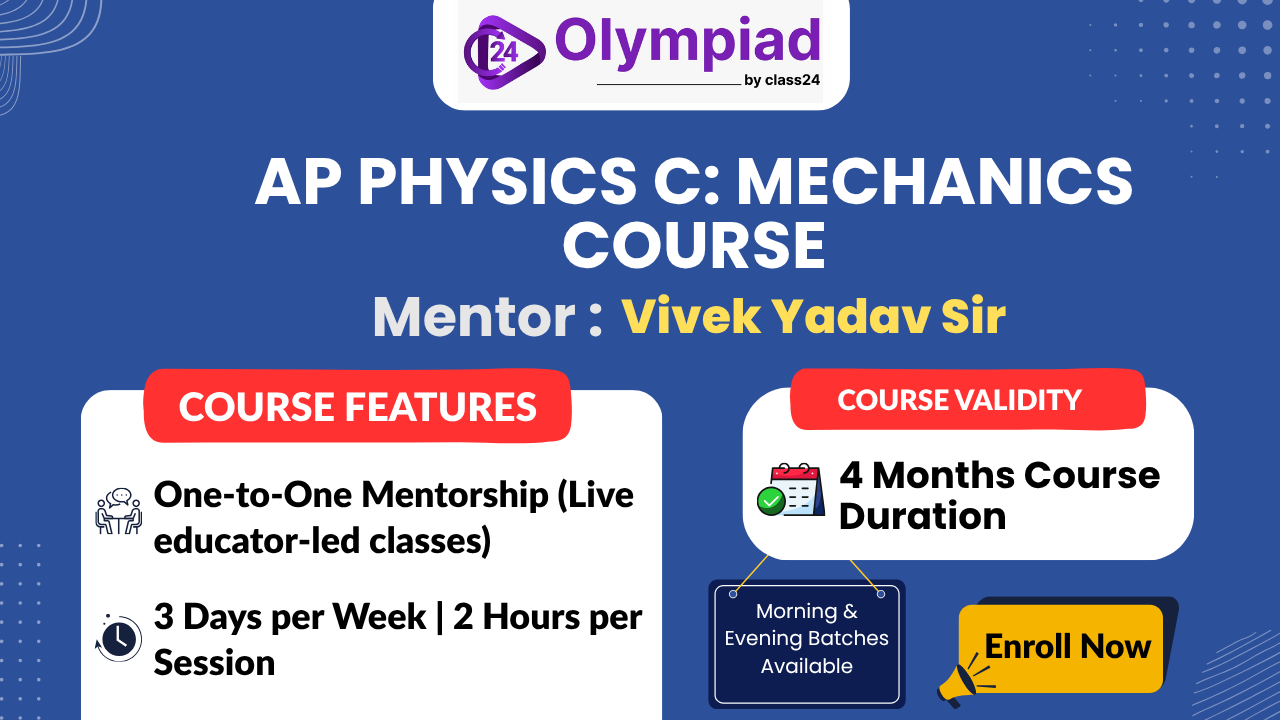AP Physics C: Mechanics 2025 – Advanced Calculus-Based Classical Mechanics Course
AP Physics C: Mechanics is a calculus-based advanced physics course that focuses on the principles of classical mechanics. Students explore topics such as motion, forces, energy, momentum, rotational dynamics, and oscillations using calculus for problem-solving. Designed for students aiming for STEM degrees in engineering, physics, and applied sciences, this course combines rigorous theory with laboratory experiments and simulations. With a structured syllabus and exam-focused preparation, AP Physics C: Mechanics helps students build strong analytical skills, earn potential college credits, and prepare for higher-level STEM programs at top universities.
About the Course
AP Physics C: Mechanics uses calculus to explore classical mechanics. Topics include motion, forces, energy, momentum, rotational dynamics, and oscillations. Ideal for students aiming for STEM degrees in engineering or physical sciences.
Course Units:
AP Physics C: Mechanics is one of the AP Physics C examinations. Although the provided source does not offer a separate "About the Course" section for Mechanics, its units cover classical mechanics topics in depth:
- Unit 1: Kinematics – Focuses on the study of motion and associated quantities: position, velocity, acceleration, and time.
- Unit 2: Force and Translational Dynamics – Investigates Newton's laws of motion, describing relationships among moving objects and the forces acting upon them.
- Unit 3: Work, Energy, and Power – Defines and calculates work, energy, and power, and familiarises students with the principle of conservation as a foundational physics model.
- Unit 4: Linear Momentum – Introduces the concepts of impulse and momentum, and the conservation of linear momentum.
- Unit 5: Torque and Rotational Dynamics – Aims for an in-depth understanding of rotational motion by investigating torque and rotational statics, kinematics, and dynamics.
- Unit 6: Energy and Momentum of Rotating Systems – Explores the energy and momentum of an object rotating around an axis, connecting these concepts to their linear equivalents.
- Unit 7: Oscillations – Applies the learned tools, techniques, and models to analyse simple harmonic motion.
Professional Online Tutoring in Science & Math
Unlock your child’s true potential with expert-led, interactive online classes that make complex concepts simple, spark curiosity, and build lasting confidence in STEM subjects.
- Customized learning plans for every grade
- Live, engaging sessions with experienced educators
- Globally aligned curriculum for future-ready skills
Book a 1-on-1 Counseling Session

Benefits of AP Physics 3 Mechanics
- High-order STEM foundation: Enhance college-level knowledge in physics, engineering, and scientific research.
- Practical learning: Put theory into practice based on experiments and simulations that reflect practical uses of the theory.
- Problem-solving and critical thinking: Build critical thinking and quantitative problem solving of complex physics problems.
- College credit opportunity: Study to take the AP Physics 2 exam and get possible credits to speed up your college work.
- Relevance in daily life: Learn the science of common everyday things, such as refrigeration, or the effect of magnets.
Why Choose Us
The course is AP Physics 3 on which we provide an interesting and conducive learning atmosphere:
Professional teachers
Get taught by teachers with years of experience in AP physics and strategies of success.
Interactive curriculum
Be engaged in labs, simulations, guided exercises in order to grasp every concept.
Individualized instruction
Receive individualized instructions to answer individual learning requirements and speed.
Exam-based training
Learn how to master AP-type questions, time management, and high-scoring in the test.
What We Offer?
By taking AP Physics 3, students have access to:
- Detailed course notes on each unit and idea.
- Simulation and laboratory experiments to support learning.
- Problem solving step by step instructions and practice.
- Simulations and mock tests of AP exam to enhance confidence and performance.
- Frequent doubt-clearing and individual mentoring.
- Progress tracking tools will be employed to have mastery of all topics.
AP Physics C: Mechanics (Test-1)
Download the complete AP Physics C: Mechanics (Test-1) PDF that includes both questions and detailed solutions. Practice essential topics like Newton’s Laws, Work & Energy, Rotational Motion, and Oscillations to strengthen your foundation for the AP exam.
AP Physics C – Mechanics (Test-1) Questions & Solutions
- Section I: 40 Multiple-Choice Questions | 1 hour 20 min | 50% of total score
- Section II: 4 Free-Response Questions | 1 hour 40 min | 50% of total score



